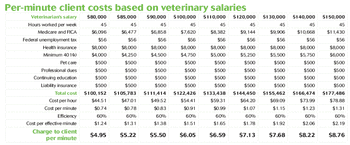
Veterinarians lead emergency storm response.

Ohio VMA has vocally opposed proposed tax, saying it would hurt economy further.

Orman's niece, Katelyn Stender, DVM, was a graduate.

When your aunt is a world-renowned financial guru, you still have veterinary school debt-you're just more excited about it.

This is a 3-week course that addresses the basic elements and components of financial practice management. Topics covered include performing in-house or outsourcing payroll, bookkeeping tasks, the profit-loss statement, cash and accrual methods of accounting, accounts receivable policies and procedures, accounts payable filing system, and how to maximize collection efforts and minimize bad debts. (10 CE credits)

This is a 3-week course designed to assist practice managers and administrators in creating or updating their company's employee compensation and benefits policies. Topics covered include compensation terminology, employee types and creating fair wage/salary policy for each job description, when and how to compensate employees, how to avoid employee debt to the practice, payroll options and procedures, how to implement benefit selection, government guidelines for garnishing employee wages, and what to expect before, during, and after an inspection. (10 CE credits)

This 3-week course is designed to give you the tools you need to take an analytical look at your marketing efforts in order to make modifications where they are needed to differentiate your practice from others. (10 CE credits)

This 3-week course discusses the basic elements and components of the financial aspects of a veterinary hospital. The material addresses hospital revenues, fees that generate revenue, expenses, measuring performance, and monitoring benchmarks. Topics covered include standard veterinary performance measures, basic veterinary industry norms or benchmarks, the differences between active and passive incomes, cost behavior in a small animal clinic setting, common variable and fixed expenses in a small animal practice, and how to establish a good, sound financial policy. (10 CE credits)

Move beyond sticker shock by reframing your prices.

I usually don't do spays or neuters on my own pets, so you shouldn't consider designing your own hospital. Here are more veterinary design don'ts.

As veterinary visits have dropped, pet owners' willingness or ability to spend money on medications has declined as well.

Expanding your veterinary practice into a new facility doesn't have to keep you awake at night-if you take necessary precautions ahead of time.

These tips can spice up your professional life now and build stamina for the years to come.

Want to realize a return on your veterinary school investment? It's as simple as charging for your services-all of them.

Karen Felsted offers advice for veterinary practices struggling with decreasing revenue and increasing costs.

Whether you're a young pup or a wise old dog, here's how to make sure you're on the path to a successful future.

Medical progress exams ensure pets get better care and increase profits.

A look inside veterinary practice accounting.

Commitment to wellness packages requires due diligence.

Price tag now tops $1.2 billion.

Use this information to learn more about personal protection devices.

Use these tips from Dr. James Guenther to make sure you're measuring up in your equine practice.

Moderator Dr. Fred Metzger and four other veterinary practice management experts met in early 2013 and discussed how to price and promote diagnostics for the betterment of pets nationwide.

$800,000 deal will be for approximately 12,000 policyholders.

Q. Illinois law states that I receive time-and-a-half for overtime, which is more than 40 hours in a work week. But when I work 35 hours one week, then 45 hours the next week, my boss doesn't pay me overtime because it balances out to 80 hours in a pay period. What's right, and what should I do?

Find out if you're paying your veterinary staff the right amount.

Mysterious overtime, skipped lunches, and non-merit raises could add up to a financial disaster.

Get a head start on the year with an overview of big changes to the tax codes that affect your practice-and your paycheck.

Follow these common design faux pas and you'll have veterinary clients frustrated in no time.